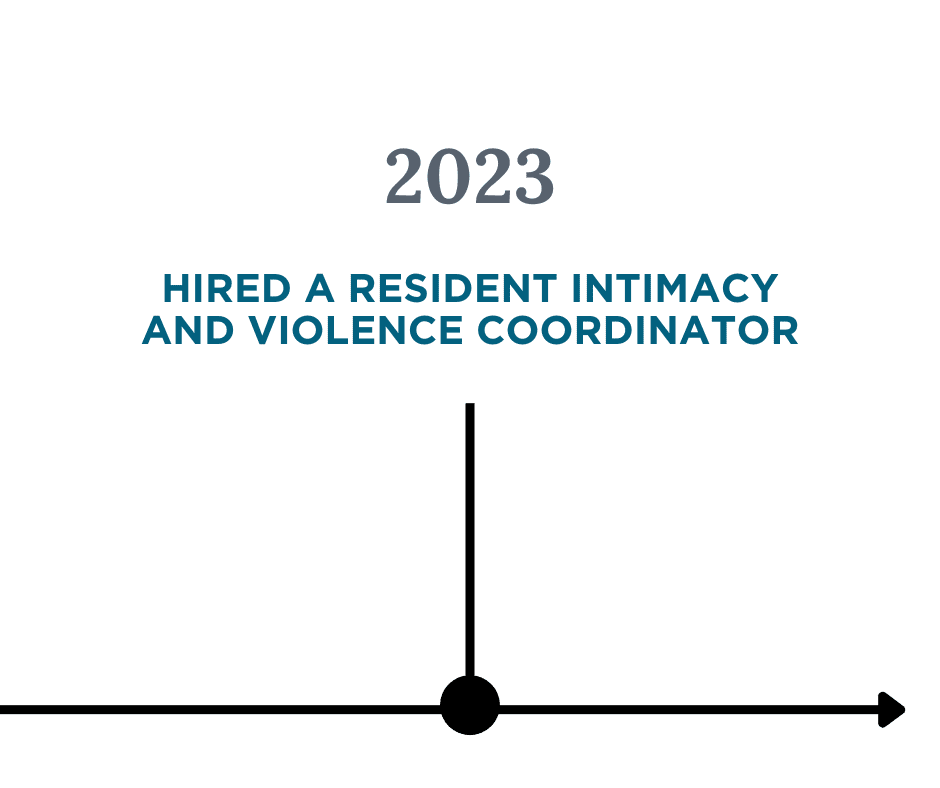Northlight Theatre is proud of creating and maintaining equitable practices. Values aligning with equity, diversity, and inclusion have been at the forefront of our mission since our inception. Practices such as salary transparency, our Artistic Fellowship Program, and opportunities for audience discourse on challenging topics have been in place for many years.
Beginning in 2018, Northlight founded our Equity, Diversity, and Inclusion Committee to formalize and streamline our EDI practices. This committee, including both internal and external stakeholders, evaluates internal systems and takes actionable steps toward lasting institutional change. In 2020, we re-committed to doing the ongoing, internal, antiracist work our organization needs to become a better ally. We are committed to a continuous cycle of evaluation, implementation, and accountability.
Below is a timeline of selected events and training that have been implemented since the committee was formed.
See our EDI Year in Review for further details on current practices and ongoing action items.
LAND ACKNOWLEDGMENT
Northlight Theatre sits on the traditional homelands of the people of the Council of Three Fires, the Ojibwe, Odawa, and Potawatomi as well as the Menominee, Miami, and Ho-Chunk nations. The original peoples of this region had shared cultural customs that allowed for the establishment of trade practices across the region. Indigenous people continue to live in this area and celebrate their traditional teachings and lifeways. Today, roughly 35,000 Native people from over 100 tribes live in the Chicagoland area.
Northlight Theatre makes this acknowledgement as part of our commitment to dismantling the ongoing legacies of settler colonialism from which we benefit. We commit to learning about and honoring the Indigenous peoples who stewarded and continue to steward the lands we have occupied and continue to occupy.
What is a Land Acknowledgment?
A land acknowledgement is a statement that recognizes and respects Indigenous Peoples as traditional stewards of this land and the enduring relationship that exists between Indigenous Peoples and their traditional territories.
Why make a Land Acknowledgment?
A land acknowledgment recognizes that Northlight Theatre has benefited from what scholars call “settler colonialism,” the effort to encourage white newcomers to settle and colonize Native American territory and thereby dispossess Indigenous peoples from land that they had occupied and considered important since time immemorial. This coerced dispossession and forced removal of Native peoples through treaties and various military campaigns throughout American history is essential to understanding the history of Skokie and Evanston, including its cultural and educational institutions.
INFORMATION & PRONUNCIATION GUIDE
Council of Three Fires
The Council of Three Fires, also known as the People of the Three Fires, the Three Fires Confederacy, the United Nations of Chippewa, Ottawa, and Potawatomi Indians, or Niswi-mishkodewin in the Anishinaabe language, is a long-standing Anishinaabe alliance of the Ojibwe (or Chippewa), Ottawa (or Odawa), and Potawatomi Native American tribes and First Nations.
In this Council, the Ojibwe were addressed as the “Older Brother,” the Odawa as the “Middle Brother,” and the Potawatomi as the “Younger Brother.” Consequently, whenever the three Anishinaabe nations are mentioned in this specific and consecutive order of Ojibwe, Odawa, and Potawatomi, it is an indicator implying the Council of Three Fires as well.
Potawatomi | pronounced pot-uh-WOT-uh-mee
The name Potawatomi comes from the Ojibway word potawatomink, which means “people of the place of fire.” The Potawatomi call themselves Nishnabek, meaning “true or original people.”
Ojibway | pronounced oh-JIB-way
Ojibway means “puckered up,” and it is thought to come from the way the tribes’ moccasins were gathered at the top. Ojibway is also spelled Ojibwe, Ojibwayy, Ojibwa, and Otchipwe.
Ottawa | pronounced AH-tah-wah
Ottawa comes from the Algonquian word adawe meaning “to trade.”
Menominee | pronounced muh-NOM-uh-nee
Menominee, sometimes spelled Menomini, means “Wild-Rice People.”
Miami | pronounced my-AM-ee
Miami also called Maumee, the name may come from the Miami-Illinois word Myaamia, meaning “allies.”
Resources:
Mitchell Museum of the American Indian https://mitchellmuseum.org
American Indian Center of Chicago https://aicchicago.org/
Illinois Historic Group Director https://www.ihgd.org/
History.com https://www.history.com/topics/native-american-history/american-indian-wars






